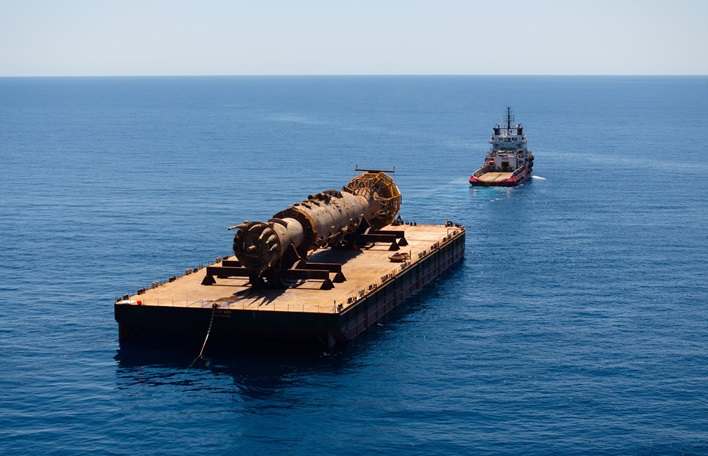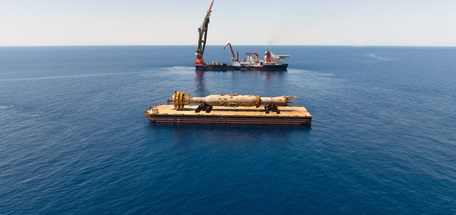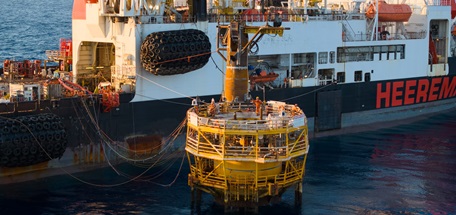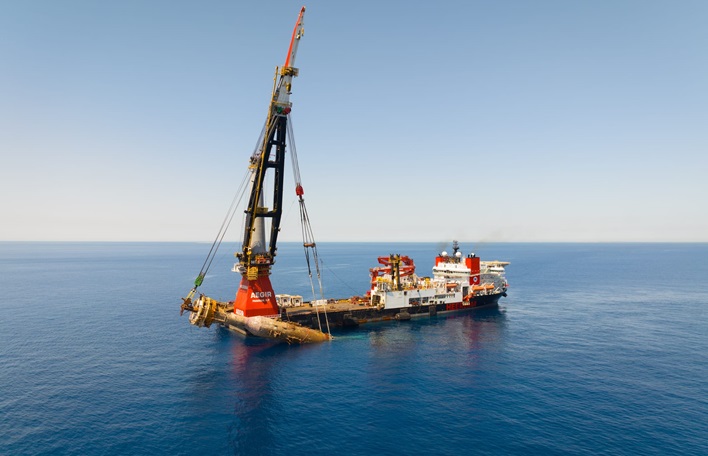
Decommissioning
Decommissioning involves addressing infrastructure that is no longer required in a timely, safe and environmentally responsible manner.
Decommissioning involves addressing infrastructure that is no longer required in a timely, safe and environmentally responsible manner
This can include full removal of structure or other alternatives.
Our approach1
Woodside is committed to executing our decommissioning activities with a focus on safety and the environment, coupled with efficiency. Decommissioning is integrated into project planning and operations, from the early stages of development through to the end of field life. This includes conducting assessments to inform our planning and decision making, which is underpinned by science and marine research. In the developing regulatory environment, we continue to listen, learn and respond to our stakeholders, while expanding our global decommissioning experience.
Our decommissioning approach recognises the importance of reusing and recycling material from our decommissioning activities where possible. We expect our contractors to apply Woodside’s waste mitigation hierarchy to maximise recycling efforts. This process prioritises reduction, reuse, recycling, and treatment over disposal. Our approach to decommissioning considers efficiencies relevant to all offshore decommissioning activities and onshore disposal. Woodside’s decommissioning estimate and restoration provision is calculated in accordance with relevant accounting standards. Our balance sheet is audited annually as part of financial reporting.
Our performance2
Woodside continued execution of planned decommissioning work in 2024, spending approximately US$805 million in the year across our portfolio. Woodside is executing several decommissioning projects and we continue to work with relevant regulators in each location to progress our decommissioning commitments.
Our priority as we conduct decommissioning work is the safety of our people and the environment. We conduct this work using recovery methods developed by our contractors and workforce.
We are working with a range of contractors, both domestic and international, that bring experience, technical know-how and the specialist offshore vessels required for the variety of activities in our decommissioning portfolio.
International decommissioning activities conducted in 2024 include the plug and abandonment of one deepwater well at each of our non-operated Mad Dog and Atlantis assets, off the coast of Louisiana. Woodside is continuing offshore execution of a significant decommissioning campaign offshore Western Australia. During 2024, Woodside made substantial progress across a range of decommissioning activities at the Enfield, Griffin, Stybarrow and Echo Yodel fields while also undertaking other decommissioning activities such as well plugging at locations offshore north-west Australia.
The Enfield project located approximately 38 km north of the North West Cape, Western Australia, ceased production in November 2018. Offshore decommissioning activities at Enfield commenced in April 2022 and is expected to be completed in Q1 2025 with the planned recovery of the Nganhurra FPSO’s anchors, chains and moorings.
All 18 Enfield wells have been permanently plugged and abandoned and the associated xmas trees and wellheads recovered. More than 40 km of pipeline, flexible flowlines and umbilicals, and eight subsea structures have been recovered. Following the successful recovery of the Nganhurra Riser Turret Mooring (RTM) in November 2023, deconstruction of RTM at the Australian Marine Complex was completed in March 2024, with more than 95% of the RTM to be reused or recycled.
Woodside has continued decommissioning of the Griffin and Stybarrow fields, including the successful recovery of the Griffin RTM in December 2024. The Griffin RTM was transported to the Australian Marine Complex at Henderson in Western Australia for cleaning and dismantling in preparation for recycling and reuse.
Across Griffin and Stybarrow, over 100km of pipeline, flexible flowlines and umbilicals has been recovered and transported to an onshore decommissioning facility near Onslow in the north west of Western Australia for cleaning in preparation for recycling and reuse. At Griffin, all rigid piping has been recovered and wellhead severance activities have been completed. A well plug and abandonment campaign at Stybarrow is 79% complete, with seven wells plugged and abandoned.
Throughout 2024, the Gippsland Basin Joint Venture (GBJV), which Woodside has a non-operated interest in, continued planned decommissioning activities in the Bass Strait, off the south-east coast of Victoria, Australia. By the end of the year, plug and abandonment work was completed on more than 150 wells. The GBJV also awarded contracts for the heavy lift removal and disposal of a number of the offshore facilities within the Gippsland Basin and continued to execute preparatory decommissioning activities for an offshore removal campaign planned for late 2027. Waste management is a key requirement in our decommissioning contracts and we are working with our service providers to minimise waste to landfill by promoting opportunities to reuse and recycling of our decommissioned infrastructure. Materials processed from our decommissioning projects have achieved a targeted 95% reuse/recycle of materials.
Woodside is working with a range of Australian businesses, many with experience supporting defence, mining and refinery disposal, which are playing leading roles in our onshore disposal scopes, adapting established processes and pathways to support the unique requirements of the oil and gas industry.
Woodside continues to undertake stakeholder consultation to inform planning and execution of our decommissioning activities, including development of Environment Plans. In 2024, ten environment plans were accepted by federal and state regulators with another two plans under assessment. Creating greater certainty on regulatory approval timeframes and streamlining regulatory complexities would support efforts to drive efficiency in the Australian decommissioning industry.
Planning
Planning for decommissioning starts well in advance of asset end of life to pursue mutually beneficial environmental, regulatory and social outcomes for the communities we operate in.
Woodside continues to develop processes to embed sustainable decommissioning principles at a project’s development phase, including early analysis of options. Woodside recognises that decommissioning is an integral part of project planning and should be assessed holistically to support project decisions. Woodside remains committed to decommissioning outcomes aligned with local regulatory requirements and industry best practices.
The decommissioning requirements for each Woodside asset is identified in an asset-specific closure management plan, which is then maintained for the life of the asset. During an asset’s operating life, these closure plans enable future decommissioning requirements by ensuring facility operations and maintenance are aligned to meeting them.
As an asset approaches the end of field life, detailed planning for decommissioning commences. This detailed decommissioning planning phase includes evaluation of decommissioning scopes and options, engaging with stakeholders on decommissioning activities and outcomes, progressing engineering studies for field execution, identifying pathways for the equipment to be recovered (repurpose, reuse, recycle, disposal), establishing resourcing and contracting requirements, and acquiring required regulatory approvals. Over the next few years, a number of currently producing assets expect to approach the last years of their production life. Woodside plans to engage with stakeholders, including communities where we operate, joint venture partners and regulatory agencies to inform decommissioning options, identify and consider potential impacts, and support Woodside’s sustainable development approach.
Consistent with this, detailed decommissioning planning has or will soon commence for the Angel gas platform (based in the North West Shelf, Western Australia), Greater Angostura oil and gas assets in Trinidad and Tobago, and Ngujima-Yin FPSO facilities (offshore Exmouth, Western Australia). Detailed planning for progressive decommissioning (via plug and abandonment) is also underway for a number of wells in Australia, including some inactive wells associated with still operating assets.
As part of decommissioning planning activities, Net Environmental Benefit Analysis (NEBA) studies are also considered by Woodside to be an important tool as they are specifically focused on environmental benefit analysis of the different options for retiring or removing producing assets. In coming years, as part of early planning, input studies for NEBA assessments are expected to commence for North West Shelf trunkline facilities and have recently been completed for Senegal. The trunkline studies plan to include a focus on habitat retention by establishing a baseline of the marine life environment to inform the decommissioning strategy.
Research and technology
Woodside is a founding member of Australia’s National Decommissioning Research Initiative (NDRI). NDRI is a collaborative industry fund that undertakes independent environment research to support the future assessment on the benefits, risks and impacts of different decommissioning options for offshore oil and gas infrastructure.
NDRI is in Phase 2 of its research program, which commenced in 2023 and is planned to run through to 2026. Phase 2 is focusing on improving the understanding of the marine environment around existing infrastructure. In 2024, NDRI established the Phase 2 Independent Scientific Advisory Board, comprising a range of independent experts who plan to review NDRI-commissioned research. NDRI has commissioned research on the identification and assessment of contaminants, a report on an assessment framework for mercury and naturally occurring radioactive material (NORM), and a literature review and development of a risk framework for non-metal components associated with decommissioning of offshore oil and gas infrastructure. NDRI plans to finalise and publish these reports in 2025.
Woodside sponsors several research and development programs which aim to improve health, safety and environment outcomes and supports innovation in decommissioning activities. Since 2021, we have committed more than US$4 million to support more than 20 additional projects with our research partners at Curtin University, Monash University, the University of Melbourne, the University of Western Australia, and with large firms, start-ups and other industrial innovators. These projects consider environmental monitoring, circular economy3, and development and commercialisation of novel technologies that create efficiencies in decommissioning. The research also intends to help build local capability and capacity, thereby supporting better environmental, social and economic outcomes for the communities in which Woodside operates.
During 2024, Woodside continued to invest in science and biodiversity programs to inform decommissioning options for our offshore oil and gas infrastructure.
The Angel Platform has been operating, as part of the North West Shelf project, Western Australia, since 2008 and is progressing towards end of field life later this decade. Over the last 16 years, the platform and its associated gas export pipeline have become home to many fish and marine invertebrates. In 2024, Woodside began working with the Australian Institute of Marine Science (AIMS) on an assessment of marine communities associated with the platform’s subsea structures and surrounding natural seabed habitats.
During April - May 2024, AIMS undertook fieldwork activities including using a remotely operated vehicle (ROV) to conduct a visual survey of the platform, pipeline, and surrounding ecosystems to understand marine communities. Fish traps were placed at the platform, sections of pipeline, and at adjacent natural habitats to collect samples that will provide information about fish health and age and their importance to regional fisheries. Sediment and water samples were collected across various depths at the platform and at adjacent natural habitats. Data and sample analysis is ongoing with the results, expected in 2025, supporting assessment of potential decommissioning options for the Angel infrastructure.
In 2025, Woodside plans to invest in studies in the following areas to inform our decommissioning activities:
- Technology advancement in well plug and abandonment execution
- Reuse options for materials emerging from decommissioning, including plastics
- Infrastructure and equipment removal execution methods
- Enhanced utilisation of data and digital models to create efficiencies in planning and execution
- Technologies to increase automation in decommissioning
- Environmental impacts of infrastructure removal
- Chemical deposition assessment
Collaboration
Safe and sustainable4 decommissioning of oil and gas assets requires a collaborative effort across industry and governments.
Industry wide collaboration will help manage the challenges arising from competition from other industries and locations for resources, equipment and decommissioning facilities.
Woodside is an active member of the International Association of Oil & Gas Producers (IOGP) decommissioning working groups. As part of the IOGP, Woodside has access to subject matter experts, research data, and best practice guidelines – all of which are imperative for sustainably4 decommissioning our assets. Through IOGP Woodside is also contributing to the development of sustainable4 concepts for key themes within the global decommissioning landscape.
Woodside is a key contributor into the Western Australian Government's LNG Jobs Taskforce - Decommissioning Working Group, focused on growing local decommissioning capability. We are dedicated to sharing our expertise and best practices into this collaboration between industry and government, to support the development of decommissioning skills and training, circular economy opportunities and identifying ways to simplify complex decommissioning regulatory protocols.
In collaboration with the Centre for Decommissioning Australia (CODA) and other operators, Woodside has invested $100,000 AUD to participate in CODA’s Operator Work Program aimed at reducing risks and improving efficiency of decommissioning activities, to ensure safe and sustainable4 decommissioning delivery. Our commitment to the CODA program underscore’s Woodside's long-term dedication to working collectively with other operators to address and find solutions to critical industry challenges on a national scale.
As Woodside advances through the decommissioning phase of an asset’s lifecycle, Woodside intends to identify and share valuable insights and best practices . Our commitment to learning and knowledge-sharing is evident through active participation in industry and regulatory decommissioning forums in 2024, such as the NOPSEMA Better Practices Forum.
In December 2024, the Australian Government released its Offshore Resources Decommissioning Roadmap, and announced the establishment of an Offshore Decommissioning Directorate that aims to “maximise the benefit of decommissioning oil and gas infrastructure to the Australian economy and the environment.” Woodside will continue to engage and support the Australian Department of Industry, Science and Resources, including the newly formed Decommissioning Directorate, to better understand and define high-level actions identified in the Roadmap.
Footnotes
Footnotes
Sustainability links
Click the links below to navigate through to more sustainability pages.
Get our latest news, project updates and announcements delivered straight to your inbox.




